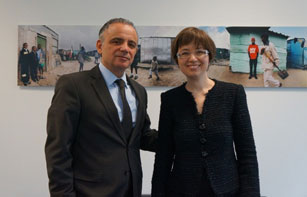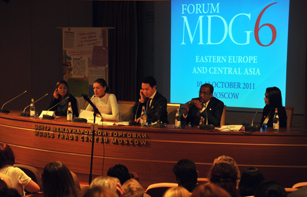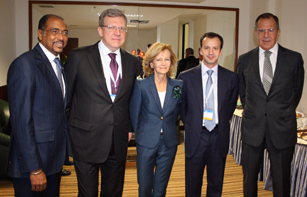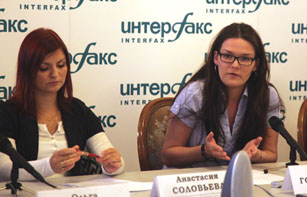
Julia Lasker participated in a panel discussion entitled Achieving MDG6 in Eastern Europe and Central Asia: Focus on Women and Girls.
Credit: UNAIDS/Stan Honda
The glamorous world of pop music and the grim realities of the HIV epidemic in Eastern Europe and Central Asia may seem like strange bedfellows. However, Russian singer and AIDS activist, Julia Lasker, engages in both with full commitment.
Ms Lasker became interested in AIDS in 2009 as she had friends living with HIV. She realised how limited the understanding of AIDS was among young women and, since then, has used her public profile and popularity with young audiences to raise awareness of HIV. “I feel personally responsible for many young girls whom I may prevent from being infected just by providing them with knowledge about the virus and how to prevent it,” she said.
Last week, Ms Lasker returned from New York, where she participated in a panel discussion entitled Achieving MDG6 in Eastern Europe and Central Asia: Focus on Women and Girls organized as part of the UN Commission on the Status of Women. During the discussion she called for a new approach to HIV. “There is a huge need to openly discuss the issue in the society, encourage people to test for HIV, encourage young people to protect themselves and their loved ones, call for tolerance.”
Hosted by the Government of Russia together with the Governments of Finland and Sweden and UNAIDS, the panel discussion brought together government, civil society and UN representatives to find ways to effectively respond to the growing HIV epidemic in Eastern Europe and Central. The event was a follow up to the International Forum on MDG 6—to combat HIV/AIDS, malaria and other diseases—convened in October 2011 under the leadership of the Government of Russia.
Russia stands ready to put its leadership into action assisting countries in the region to achieve MDG6
Dimitry Maksimychev, Deputy Permanent Representative of the Russian Federation to the United Nations
“It is clear that countries in Eastern Europe and Central Asia need to act quickly to stop the growing HIV epidemic among women and girls,” said Dimitry Maksimychev, Deputy Permanent Representative of the Russian Federation to the United Nations. “With less than 1,000 days now until 2015, we need to work together—governments, donors, international organizations and civil society—to maximize our impact. Russia stands ready to put its leadership into action assisting countries in the region to achieve MDG6,” added Mr Maksimychev.
Julia Lasker, like many other women and men engaged in the HIV response in the region, remains determined. “If I can get this message to at least a few people, it's a step in achieving the goal of zero new HIV infections, zero AIDS-related deaths and zero discrimination.”
Women and HIV in Eastern Europe and Central Asia
“Women are especially at risk of HIV due to multiple factors such as economic vulnerability, fearing or experiencing violence, and difficulties in negotiating for safe sex,” said UNAIDS Regional Director for Eastern Europe and Central Asia a.i., Dr Jean-Elie Malkin. “In extreme cases women combine all vulnerabilities associated with drug use, sex work, social marginalisation and stigma and discrimination which prevent them from accessing HIV services,” he added.

Julia Lasker meeting with Deputy Secretary-General of the United Nations, Dr Asha-Rose Migiro
Credit: UNAIDS/Stan Honda
The number of people living with HIV in Eastern Europe and Central Asia almost tripled between 2000 and 2009. In 2010 there were an estimated 1.5 million people living with HIV in the region. The number of new HIV infections acquired through heterosexual contact has increased by 150% in the last decade. HIV represents a growing threat for women in the region. Women make up a rising proportion of people living with HIV—up to 50% in some countries in Eastern Europe and Central Asia. In Russia, for example, the number of young women with HIV aged 15-24 is two times higher than among men of the same age.
While significant progress has been made in some areas—in 2010, 88% of pregnant women living with HIV in Eastern Europe and Central Asia received treatment to prevent HIV transmission to their child—challenges remain. Recognising that not all women are reached by HIV services and programmes, the Government of Russia together with UNAIDS and partners are collaborating to develop guidance on how to increase access to HIV treatment, care and support services for all women—including people who use drugs, their sexual partners, sex workers, prisoners and other key populations at higher risk of infection.
“There is opportunity and space for addressing the HIV needs of women, using their sexual and reproductive health concerns as an entry point,” said Evgenia Maron, of the Astra Foundation, an AIDS service organization in Russia. “There is a need to meaningfully involve women living with and affected by HIV in all aspects of the AIDS response. We know what our realities are, we know what we need and we know what the solutions are,” she added.

















